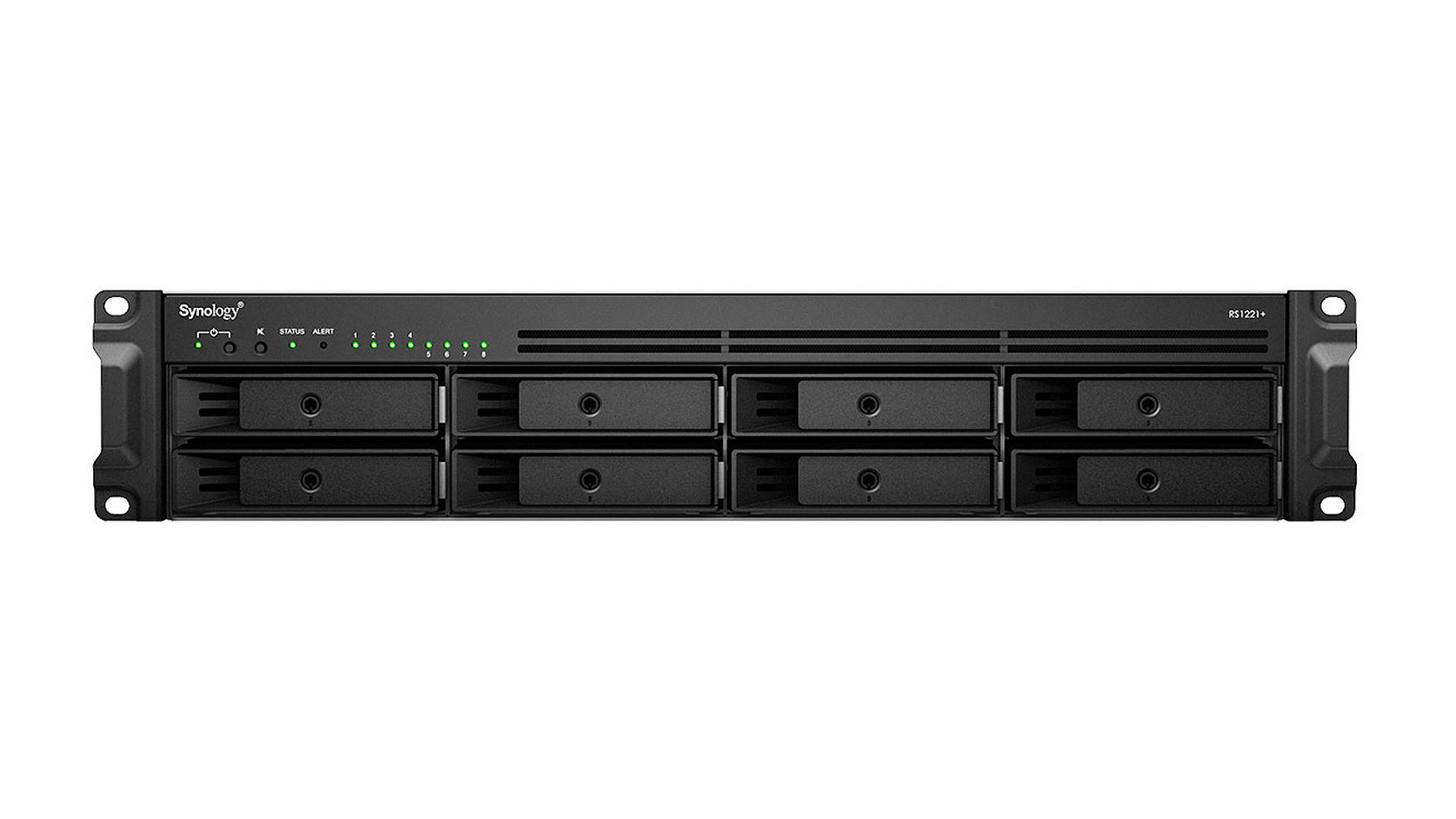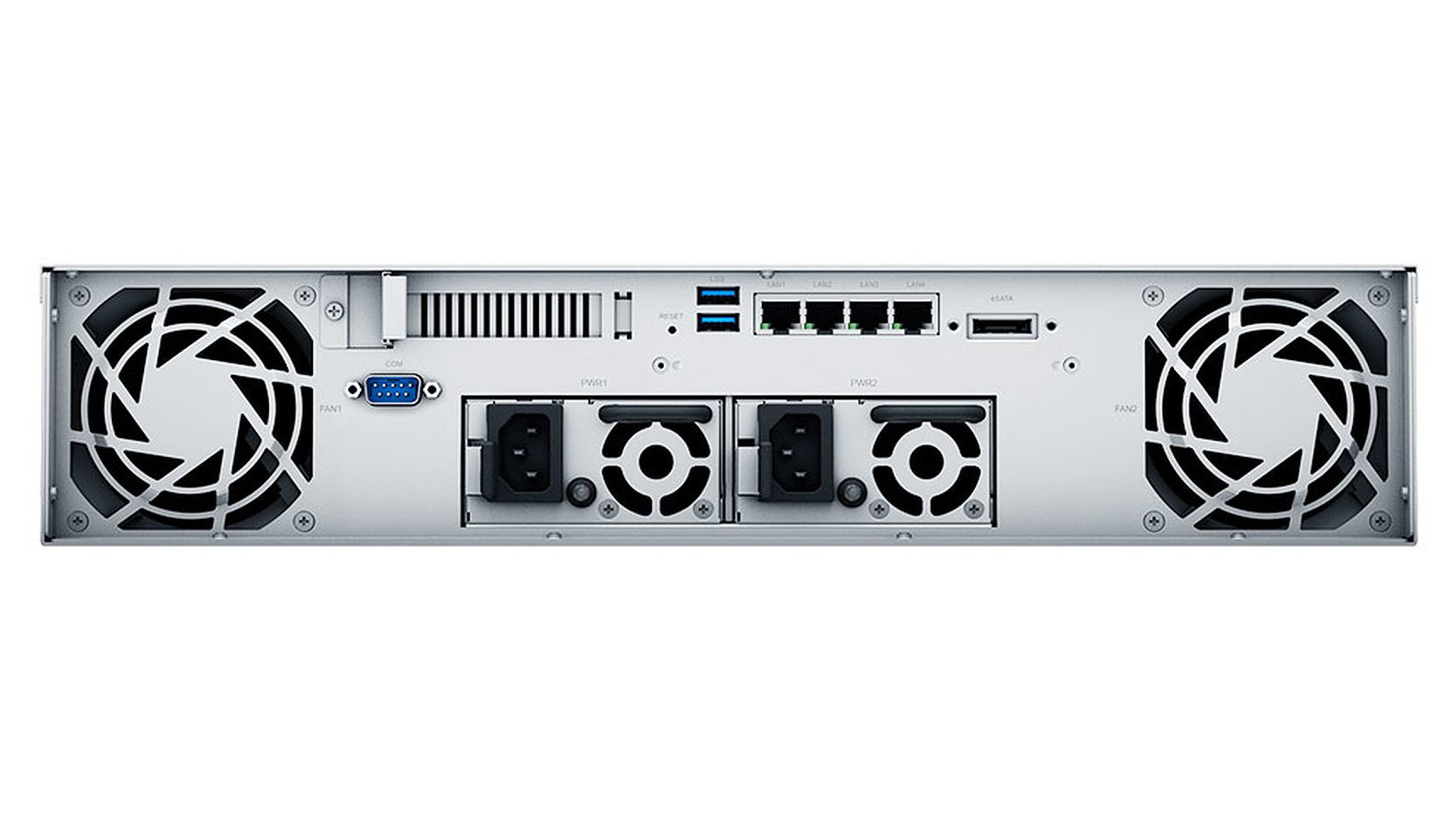Synology RackStation RS1221RP+ review: Short and sweet
It’s noisy, but this short-depth rack NAS delivers great performance and top-notch data protection

-
+
Ryzen CPU delivers noticeable performance improvement
-
+
Plenty of useful data protection features
-
+
Compact dimensions
-
-
Loud cooling fans

The times they are a-changin’: Synology’s RackStation RS1221+ is the company’s first rack NAS appliance to be built around an AMD CPU. Positioned as a replacement for the venerable RS1219+, it swaps the pensionable Atom C2538 CPU and DDR3 memory of its predecessor for a quad-core 2.2GHz Ryzen V1500B, paired with 4GB of faster DDR4 RAM.
What hasn’t changed is the design. Just like the older model, the RS1221+ comes in a space-saving short-depth chassis, allowing it to slot neatly into a small wall box or a two-post rack cabinet. The standard single-PSU model measures 307mm deep, while the RS1221RP+ model we tested is 10cm deeper to accommodate dual 350W hotplug PSUs.
Both versions offer eight hot-swap SATA drive bays, with an eSATA port at the rear for expansion using Synology’s equally short four-bay RX418 disk shelf. Next to it sit four Gigabit Ethernet ports, plus an empty PCIe slot sitting ready for a 10GbE card. If you want to make use of this, check the compatibility list before buying: the appliance refused to boot with a Broadcom card fitted and would only work with an Intel model.
With our 10GbE card in place, we set out to test performance using an SHR array formed of four 10TB Seagate IronWolf NAS drives. From a Dell T640 Xeon Scalable server running Windows Server 2019, Iometer reported sequential read and write speeds of 9.3Gbits/sec and 6.2Gbits/sec – a major step up from the RS1219+, which had only managed 7.9Gbits/sec and 3.2Gbits/sec over a 10GbE connection.
We saw big improvements in real-world operations, too. Our 25GB file copied from and to the server at average speeds of 5.1Gbits/sec and 4.9Gbits/sec – increases of 8% and 55% over the older model. Our backup test was 17% faster, while copies to an encrypted folder more than doubled in performance to 2.7Gbits/sec.

As usual with Synology, the RS1221RP+ enjoys a superb range of storage features courtesy of the slick DSM 6.2 software. Data protection couldn’t be easier, with the Snapshot Replication app providing on-demand and scheduled snapshots of Btrfs volumes, plus replication to remote Synology appliances.
Local and remote backup tasks, meanwhile, are deftly handled by the Hyper Backup app, with Active Backup for Business (ABB) handling Windows and Linux workstations, servers and VMware and Hyper-V hosts; the latest beta of ABB 2.2 adds support for vSphere 7 too.
As for virtualisation, just about any OS can be hosted on the NAS, even virtualised instances of DSM. We had Windows Server 2019 running from an ISO file in 20 minutes, and fully protected by scheduled VM snapshots. Just remember that if you want to use this appliance for any sort of serious virtualisation duties, you’ll almost certainly need to upgrade the RAM beyond the base provision of 4GB.
Other apps worth mentioning include the Drive app, which provides private cloud backup facilities, and the Storage Analyser, which helps you keep an eye on capacity by running reports showing usage for NAS shares, duplicate files and file types. The Security Advisor similarly helps keep your appliance safe by scanning it regularly for malware, and flagging up security issues such as open ports or weak passwords.
We’ve only one complaint about the RS1221RP+: its twin PSU fans are very noisy. We measured an irritating 58.7dB from one metre in front of the appliance, so it’s not great for a desktop role in a small office.
But as long as you’ve a suitable place to put it, the RS1221RP+ offers a great rack storage solution in a small package. The Ryzen CPU delivers a big performance boost over the old Intel architecture, and Synology’s DSM software is brimming with slick and genuinely useful features.
Synology RackStation RS1221RP+ specifications
| Chassis | 2U rack chassis |
| CPU | 2.2GHz AMD Ryzen V1500B |
| Memory | 4GB DDR4 ECC (max 32GB) |
| Storage | 8 x LFF/SFF hot-swap SATA drive bays |
| PSU | 2 x 350W hotplug PSUs |
| RAID support | Supports RAID0, 1, 10, 5, 6, SHR-1/2, hot-spare, JBOD |
| Network | 4 x Gigabit Ethernet |
| Other ports | 2 x USB-A 3.2, eSATA, PCIe x4 slot |
| Management | DSM 6.2 |
| Warranty | 3yr hardware warranty |
Get the ITPro daily newsletter
Sign up today and you will receive a free copy of our Future Focus 2025 report - the leading guidance on AI, cybersecurity and other IT challenges as per 700+ senior executives
Dave is an IT consultant and freelance journalist specialising in hands-on reviews of computer networking products covering all market sectors from small businesses to enterprises. Founder of Binary Testing Ltd – the UK’s premier independent network testing laboratory - Dave has over 45 years of experience in the IT industry.
Dave has produced many thousands of in-depth business networking product reviews from his lab which have been reproduced globally. Writing for ITPro and its sister title, PC Pro, he covers all areas of business IT infrastructure, including servers, storage, network security, data protection, cloud, infrastructure and services.
-
 ‘Phishing kits are a force multiplier': Cheap cyber crime kits can be bought on the dark web for less than $25 – and experts warn it’s lowering the barrier of entry for amateur hackers
‘Phishing kits are a force multiplier': Cheap cyber crime kits can be bought on the dark web for less than $25 – and experts warn it’s lowering the barrier of entry for amateur hackersNews Research from NordVPN shows phishing kits are now widely available on the dark web and via messaging apps like Telegram, and are often selling for less than $25.
By Emma Woollacott Published
-
 Redis unveils new tools for developers working on AI applications
Redis unveils new tools for developers working on AI applicationsNews Redis has announced new tools aimed at making it easier for AI developers to build applications and optimize large language model (LLM) outputs.
By Ross Kelly Published
-
 Google layoffs continue with "hundreds" cut from Chrome, Android, and Pixel teams
Google layoffs continue with "hundreds" cut from Chrome, Android, and Pixel teamsNews The tech giant's efficiency drive enters a third year with devices teams the latest target
By Bobby Hellard Published